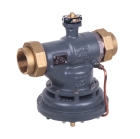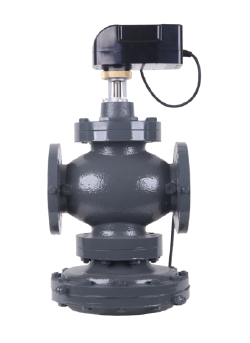Pressure-independent control valves for large systems

Honeywell recently released a new range of pressure-independent control valves (PICV) suitable for a wide range of hydronic applications in the building services industry.
This article looks at the application and operation of larger pressure reducing valves from DN40 to DN150.
The purpose of a PICV is to ensure stable flow control independent of variations in inlet pressure to the valve. These valves have three main functions
• Pressure regulation
• Flow control
• Flow regulation.
Pressure regulation is achieved by the movement of a spring-loaded diaphragm referencing the inlet to the control valve and the outlet of the flow regulator to maintain a constant pressure on the inlet of the flow-control valve. This ensures an actuator input signal or manual adjustment provides proportional flow control independent of variations in inlet pressure variations. The maximum flow setting is achieved by manually adjusting the flow regulation valve.
If an actuator is not fitted, the combination of pressure and flow regulation is effective at maintaining a constant flow rate through downstream pipework.
Adding an actuator provides the automatic flow control element of a PICV. Practical design and manufacturing considerations usually combine the adjustment of an orifice for flow regulation with the linear or rotary action of the control valve.
Convenient test-point positions are usually internally connected to the control valve inlet and the flow regulator outlet for accurate commissioning. However,for larger valves the test points have to be positioned where access is practical, resulting in external pipework connections.
The large Honeywell Kombi-QM PICVs are in two groups
• Group 3, DN40 to DN65, screwed connection
• Group 4, DN50 to DN150, flanged connection

The pipe size of the larger range of valves indicates the wide range of applications related to the capacity of equipment or the size of the pipework.
Air-handling units and chilled-water systems are typical of the application of the DN40 to DN65 range of valves. On very large pieces of plant, flanged valves may be applicable.
Flanged valves from DN50 to DN150 are usually associated with pipework architecture with high flow rates, for example single-pipe heating systems in a large commercial building.
The Group 3 and 4 Kombi-QM bodies are of ductile iron with EPDM (ethylene propylene diene monomer) synthetic-rubber seals with the inner parts of brass, stainless steel and high-resistance polymer. The pre-setting parts for adjusting flow regulation are of high-resistance polymer and dezincification-resistant brass, depending on the model.
Group 3 (DN40 to DN65) valves are supplied either as a constant pressure regulator or with the optional rotary actuators suitable for Honeywell 0 to 10 V modulating and 24/230 V AC floating control. Flow regulation is accessed from the base of the valve body. Maximum flow rates at a maximum differential pressure of 400 kPa are from 9000 l/h for the DN40 up to 18 000 l/h for the DN65.
The larger Group 4 flanged valves (DN50 to DN150) have an integral actuator with a sophisticated range of set-up and commissioning features that includes the choice of a current or voltage analogue control signal, pulse width modulation (PWM), on/off and 4 to 20 mA feedback positioning. Flow regulation is by an on-board user interface with optional manual over-ride. Maximum flow rates at a maximum differential pressure of 400 kPa is from 20 000 l/h for the DN50 up to 150 000l/h for the DN150.
The integral commissioning test points on all Kombi-QM valves are equipped with SafeConTM test valves.
A full set of sizing, installation, commissioning and service information is provided with each valve and actuator.
The operating temperature for all the Honeywell Kombi-QM range of valves is -10 to +120°C, and they are suitable for water or water-glycol mixture up to 50%.
If you would like more information on the Honeywell Kombi-QM PICVs please visit the link below.







